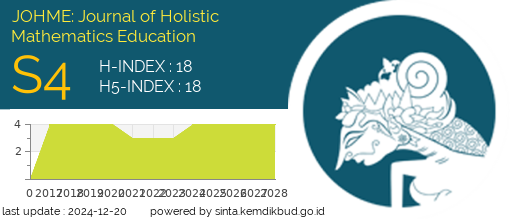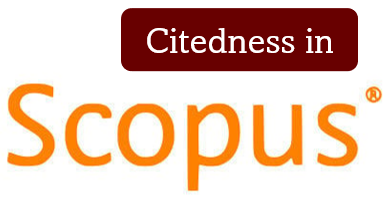IMPLIKASI PENDIDIKAN YANG BERPUSAT PADA KRISTUS DALAM KELAS MATEMATIKA [THE IMPLICATIONS OF CHRIST-CENTER EDUCATION FOR MATHEMATICS CLASSES]
DOI:
https://doi.org/10.19166/johme.v2i2.1695Schlagworte:
Christ center, student oriented, teacher guided, Mathematics class, pendidikan berpusat pada Kristus, berorientasi pada siswa, guru penuntun, kelas matematikaAbstract
The purpose of education is to develop the potential of students to become human beings who believe and fear God Almighty, have noble character, are healthy, knowledgeable, capable, creative, independent, and become democratic and responsible citizens. But in practice, much education separates science and faith in God. Christian education allows students to get to know God more and develops the potential of each student according to God's truth and purpose. Mathematics learning should be a tool to bring students to see and admire God as the great Creator. Investigation and discovery in learning mathematics should acknowledge some of God's attributes and allow students to admire the beauty of mathematics and to praise God.
BAHASA INDONESIA ABSTRACT: Tujuan pendidikan adalah untuk mengembangkan potensi peserta didik agar menjadi manusia yang beriman dan bertakwa kepada Tuhan Yang Maha Esa, berakhlak mulia, sehat, berilmu, cakap, kreatif, mandiri, dan menjadi warga negara yang demokratis serta bertanggung jawab. Namun pada pelaksanaannya, banyak pendidikan memisahkan ilmu pengetahuan dan iman kepada Tuhan. Pendidikan Kristen membawa siswa untuk semakin mengenal Tuhan, mengembangkan potensi setiap peserta didik sesuai dengan kebenaran dan maksud Tuhan. Pembelajaran matematika seharusnya menjadi alat untuk membawa siswa semakin melihat dan mengagumi Allah sebagai Pencipta yang agung. Melalui investigasi dan penemuan dalam belajar matematika seharusnya menjadi pengakuan dari beberapa atribut Allah yang membawa siswa untuk mengagumi keindahan matematika dan membawa siswa untuk memuji Tuhan.
Literaturhinweise
Abraham, J. (2015). Lupakanlah student centred learning. In H. Panggaben, A. Supraktiknya, & J. S. S. Utama (Eds.), Revolusi mental: Makna dan realisasi (pp.129-136). Jakarta, Indonesia: Himpunan Psikologi Indonesia.
Berkhof, L., & Van Til, C. (2004). Dasar pendidikan Kristen. Surabaya, Indonesia: Momentum.
Bradley, J. (2007). Teaching mathematics from a Christian perspective. ASCI World Report. Retrieved from http://www.calvin.edu/~braj/Teaching%20Mathematics.pdf
Brenford, G. (2006). Applied mathematical theology. Nature, 440, 126. DOI: https://doi.org/10.1038/440126a
Byl, J. (2007). Matter, mathematics, and God. Theology and Science, 5(1), 73-86. DOI: https://doi.org/10.1080/14746700601159598
Creswell, J. W. (2015). Penelitian kualitatif & desain riset. Yogyakarta, Indonesia: Pustaka Pelajar.
Depdiknas. (2003). Undang-undang RI No. 20 tahun 2003: Tentang sistem pendidikan nasional.
Desmita. (2010). Psikologi perkembangan peserta didik. Bandung, Indonesia: PT. Remaja Rosda Karya.
International Bacculaurette Organization. (2017). What’s an IB education? Retrieved from https://www.ibo.org/globalassets/what-is-an-ib-education-2017-en.pdf
Jongsma, C. (2007). Mathematics: Always important, never enough: A Christian perspective on mathematics and mathematics education. Pro Rege, 35(4), 21-38. Retrieved from http://digitalcollections.dordt.edu/pro_rege/vol35/iss4/3
Knight, G. R. (2009). Filsafat dan pendidikan. Tangerang, Indonesia: Universitas Pelita Harapan Press.
Kristiana, T. G., Winardi, Y., & Hidayat, D. (2017). Biblical integration in a mathematics classroom: Qualitative research in a senior high school. JOHME: Journal of Holistic Mathematics Education, 1(1), 1-9. DOI: https://doi.org/10.19166/johme.v1i1.709
Nadeak, E. H., & Hidayat, D. (2017). Karakteristik pendidikan yang menebus di suatu sekolah kristen. Polyglot: Jurnal Ilmiah, 13(2), 87-98. DOI: https://doi.org/10.19166/pji.v13i2.439
Poythress, V. S. (2015). Redeeming mathematics: A God-centered approach. Wheaton, IL: Crossway.
Prijanto, J. H. (2017). Panggilan guru kristen sebagai wujud amanat agung Yesus Kristus dalam penanaman nilai Alkitabiah pada era digital. Polyglot: Jurnal Ilmiah, 13(2), 99-108. DOI: http://dx.doi.org/10.19166/pji.v13i2.32
Priyatna. N. (2017). Peran guru kristen sebagai agen restorasi dan rekonsiliasi dalam mengembangkan karakter Kristus pada diri remaja sebagai bagian dari proses pengudusan. Polyglot: Jurnal Ilmiah, 13(1), 1-10. DOI:http://dx.doi.org/10.19166/pji.v13i1.333
Seidel, J. (2011). Mathematics: Giving classical, Christian education its voice (Master's thesis). DOI: https://doi.org/10.19166/pji.v13i1.333
Tung, K. Y. (2014). Menuju sekolah Kristen impian masa kini. Yogyakarta, Indonesia: Andi.
Van Brummelen, H. (2006). Berjalan dengan Tuhan di dalam kelas. Tangerang, Indonesia: Universitas Pelita Harapan Press.
Downloads
Veröffentlicht
Zitationsvorschlag
Ausgabe
Rubrik
Lizenz
Authors who publish with this journal agree to the following terms:
1) Authors retain copyright and grant the journal right of first publication with the work simultaneously licensed under a Creative Commons Attribution License (CC-BY-SA 4.0) that allows others to share the work with an acknowledgement of the work's authorship and initial publication in this journal.
2) Authors are able to enter into separate, additional contractual arrangements for the non-exclusive distribution of the journal's published version of the work (e.g., post it to an institutional repository or publish it in a book), with an acknowledgement of its initial publication in this journal.
3) Authors are permitted and encouraged to post their work online (e.g., in institutional repositories or on their website). The final published PDF should be used and bibliographic details that credit the publication in this journal should be included.”










